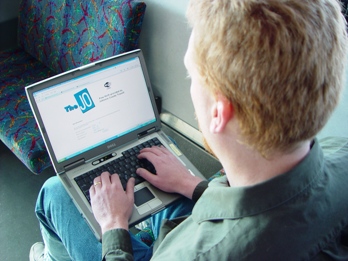
By Steve Hirano
Transit Talent

Riders can access the Internet at no cost aboard 15 of 60 fixed-route buses operated by Johnson County Transit in Olathe, Kan. Photo courtesy of Johnson County Transit
Johnson County Transit (JCT) in Olathe, Kan., has embarked on what it hopes will become a long-term, sponsorship- and advertising-supported Wi-Fi service for its bus riders. Currently, 15 of its 60 fixed-route buses offer free wireless Internet service.
The buses, which began offering the service in early August, were equipped with the Wi-Fi hardware using federal and state grants totaling approximately $15,000.
L. Scott Caldwell, JCT's technical services manager, said there's no monthly charge for the Wi-Fi service for the first year under a sponsorship agreement with Sprint and SinglePoint Communications. If JCT decides to continue offering free Wi-Fi, then it would cost $40 per month for each bus, in addition to costs associated with Wi-Fi administration software.
Caldwell said the agency is working with SinglePoint to implement Wi-Fi-based advertising with the hope that the revenue would fully fund the service. If the advertising program comes to fruition, Caldwell said the Wi-Fi service could be expanded to more buses, possibly the entire fleet.
Four-and-a-half months into the program, the Wi-Fi service has been well received by bus riders. "Our riders appreciate the free access and have requested we add this service to the rest of our fleet," Caldwell said.
No major technical problems have surfaced, which has helped to minimize any burden on bus operators, who are not trained in Wi-Fi set-up or usage. "Part of our planning was to educate riders about where to get technical support," Caldwell said. "Our drivers are there to drive and ensure our passengers arrive at their destinations safely, not to provide technical support."
To assist riders with Wi-Fi questions, JCT posted an extensive list of frequently asked questions on its website.
Caldwell said detailed planning has helped in the successful roll-out of the Wi-Fi service. "With free Wi-Fi, there are numerous functional, technical, legal and social aspects to consider prior to implementation," he said. "At the end of the day, it must be sustainable, good for transit and good for the riders."
More information about the program can be found at http://www.thejo.com/riders/wifi.shtml. Caldwell can be contacted at [email protected]
Sign up for Transit Intelligence
News and commentary in public transportation, and the latest job postings and solicitations.
Daily News Briefing
- Nearly 500 Oregon transportation workers get layoff notices after ‘preventable’ funding emergency
- Could CEO's plan actually save California’s high-speed rail project?
- U.S. Supreme Court to decide whether NJ Transit can be sued in other states
- New York City mayoral candidate Zohran Mamdani’s win has put buses in the spotlight. Should they be free?
- Opinion: Why the MBTA’s electric bus mandate is a bad idea
- North County Transit District bus drivers return to transit agency as in-house employees
- San Francisco MTA worker allegedly faked job title to get Giants, 49ers tickets and other freebies
- Golden Gate Bridge, Highway and Transportation District rescinds DEI resolutions, fearing loss of federal funds
- Milwaukee County transportation executive director steps down following MCTS audit request
- Drugs and crime are plaguing a Minneapolis transit station. Neighbors say there’s only one option
- SEPTA's fare evasion crackdown is no joke. Ask the more than 3,200 people criminally charged this year
- Results of 2023 Transit Agency Salary Survey
- Sign Up for the Transit Intelligence Newsletter for Industry News, Job Listings and Public Notices

